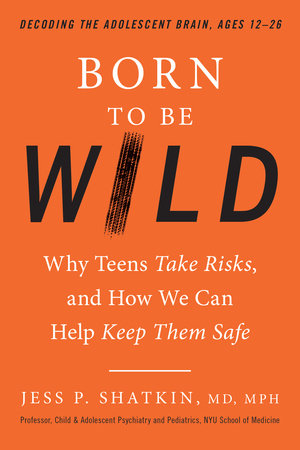5 Fascinating Insights into Your
Teen’s Brain
by Jess P. Shatkin, M.D., M.P.H.
What in the world were you thinking?!
How many times do you think you’ve said this to your adolescent child? Wild and unpredictable teen behavior can be enough to drive a parent completely bonkers. Thankfully, the past ten years have ushered in a virtual revolution in our understanding of the adolescent brain, and with it an appreciation of what we can do better to help raise resilient and less risky kids.
If you’re looking to get a better understanding of what happens when your kid enters adolescence — and why teens do some of the wild things they do — check out this list of five things you may not know about the teen brain:
1. Evolution has purposely put the teen brain out of balance. You are no doubt aware that adolescents’ emotions often get the best of them, and we now know why. The emotional part of the brain (known as the limbic system) develops faster and is not well controlled by the brain’s CEO (known as the prefrontal cortex) until our late 20s. This means that adolescents are more responsive to their emotions and struggle to control their reactions at moments when they feel stressed, tired, hungry, horny, or when their peers are watching them. Seems a shame, but from an evolutionary standpoint, this neurodevelopmental imbalance makes perfect sense. As a species we’ve needed our teens to take risks — humans are stronger and faster and tolerate pain and temperature extremes better as adolescents than they ever will as adults. If someone has to search out new mates or food and water supplies across the blazing hot savannah, why not send the one whose body can tolerate it best?
2. Dopamine makes things feel better than they ever have before. Dopamine’s real job is not to give us pleasure; dopamine is a neurochemical that tells us when something “might” give us pleasure. By promising us pleasure, dopamine drives us to learn and teaches us what’s important for our survival. Think about it this way: The first time you ate spaghetti, you didn’t know what you were in for … and for most of us, that first bite tasted great! Our brains released a big squirt of dopamine, which told us that these funny noodles really mattered. Those noodles do matter because without food we can’t survive. Now, every time we think about spaghetti (with that savory red sauce and crumbled parmesan cheese), our brains release dopamine, which tells us that we should get that noodle dish because it’s important for our survival. During our teenage years, dopamine is floating around in higher amounts than ever before, and that translates into things feeling much better than they ever have, which can lead to a lot of risk-taking behavior.
3. Hormones are doing more than you think. Some of our most important pubertal hormones, like testosterone, aren’t only about lowering our voices and putting hair on our bodies in funny places. Testosterone is really about cluing kids into the social order. Ever wonder how your fun-loving 10-year-old became a super self-conscious teen who lives and dies by what his friends think? Testosterone and other pubertal hormones like oxytocin are to blame. These hormones play a big role in our kids’ growing awareness of peers, their obsession with social status, and their desire to be a part of the “in” group. That’s all totally normal because life is a team sport, and we cannot survive without one another. These hormones tune our kids into the social zeitgeist, which is vital for our species’ evolutionary survival.
4. Melatonin matters. Melatonin is a hormone that makes us sleepy and is released by our brains at nighttime. Perhaps you know that the screens our kids watch all day and night can reduce a lot of natural melatonin release, which can disrupt their sleep. But sleep is only part of the story. Less melatonin increases the likelihood of early puberty, which is awful for our kids because it increases their risks for all sorts of bad physical and behavioral outcomes.
5. There’s pain in the brain. Ever wonder why your teen is obsessed with what his peers think? Well, here’s why: Evolution has piggybacked the brain’s social attachment system onto the brain’s pain system. When our kids are socially excluded, like not invited to a party or tagged in a Facebook photo, they feel genuine pain. That pain is so real that it can even be relieved with Tylenol. What would a kid do to avoid pain? All sorts of things, even take risks.
Looking for more insights into the inner workings of the teen brain? Check out Dr. Shatkin’s new book, Born to Be Wild.
-
Born to Be Wild: Why Teens Take Risks, and How We Can Help Keep Them Safe
Available from:Also available from:

